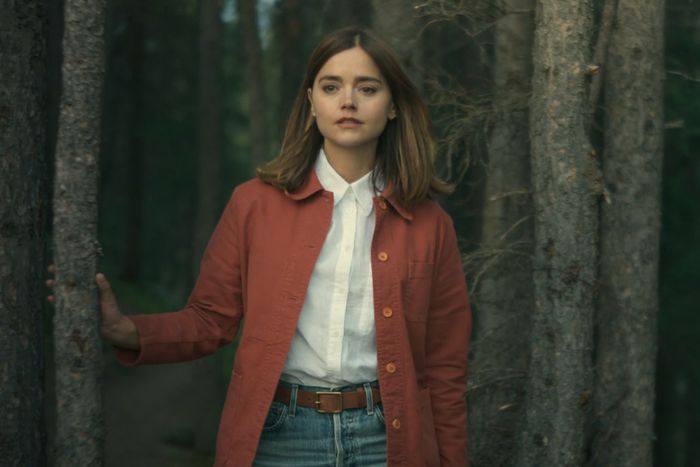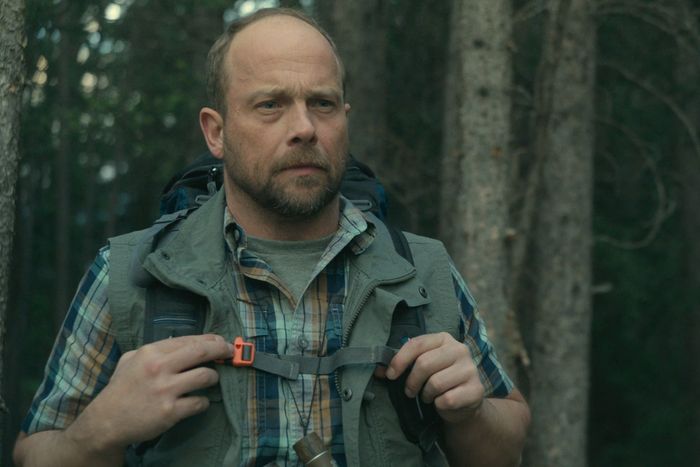
Spoilers follow for the Prime Video limited series Wilderness, all six episodes of which debuted on September 15.
We are still living in the shadow of Gone Girl’s “Cool Girl” monologue, Amazing Amy’s vengeful tirade about male expectations and assumptions and the experience of “pretending to be the woman a man wants them to be.” The righteous fury running through Gillian Flynn’s 2012 novel and David Fincher’s 2014 film adaptation (also written by Flynn) has become common to the woman-centered thriller genre, so many entries of which follow protagonists as they learn about their cheating boyfriends or husbands, plan their revenge, and have to fight for their survival. It’s not a surprise, then, that Wilderness sticks to this format like following a checklist. But when it pulls out its own version of the “Cool Girl” speech, the catharsis it wants us to feel isn’t so amazing.
The title Wilderness can suggest uninhibitedness and freedom, spontaneity and disorientation, a place to get lost and be found. Based on the same-named novel by B.E. Jones, the Prime Video series tries to put a girl-power spin on that idea of the outdoors by using the National Parks as a backdrop for a murder plot. The series follows married couple Liv (Jenna Coleman) and Will (Oliver Jackson-Cohen), Brits who moved to New York City for his job. Visa complications mean that Liv can’t work, so the former journalist — we never learn what she used to write about — spends her days at home working on her novel, which is implied to be the story we’re currently watching. “I was whoever people needed me to be. When it was safe to, I stopped pretending. Finally, I could just be me,” Liv says of her relationship with Will in voice-over narration, but their seemingly perfect marriage doesn’t last. Will is cheating on Liv, and when she learns that what he swore was a one-night stand is actually a monthslong affair, she plans to murder him during a road trip through the American West.
How easy would it be to push him over a cliff or drown him during a rafting trip? Liv plans both options, but can’t go through with it; when Will’s mistress and co-worker, Cara (Ashley Benson), unexpectedly shows up at Yosemite with her boyfriend, Garth (Eric Balfour), things get even more complicated. Cara’s soon dead, and the police suspect Garth. Will begs Liv to be his alibi for the night, not knowing that Liv actually killed Cara after mistaking her for Will. When Liv agrees to vouch for his whereabouts, Will thinks he’s in the clear. Liv is busy planning a way to shift suspicion toward him, though, and when they return to New York City, she puts her plan in action.
If you’ve read enough books or seen enough shows that express feminism primarily as individual women standing up for themselves in relationships (Big Little Lies, Surface, The Undoing, Bad Sisters, The Girl Before), Liv framing Will as payback for his infidelity isn’t a surprise. Even the series’s theme song, “Look What You Made Me Do (Taylor’s Version),” aligns with the idea of a woman taking back what she’s owed, being one of the rerecordings Taylor Swift made to distance herself from Scooter Braun, who owns her masters. Swift lyrics like “Then the world moves on, but one thing’s for sure / Maybe I got mine, but you’ll all get yours,” which combine big observations about how things work with a personal vow for retaliation, are echoed in Liv’s narration. “Revenge, it’s nothing more than hunter and prey”; “Survival … all comes down to who’s prepared to draw first blood”; “You asked for my story. I didn’t say it would all make sense, because love is the one thing that doesn’t” are fairly hokey statements, but Coleman delivers them with verve and relish, really committing to how Liv has convinced herself that the only way out of her marriage is over someone else’s dead body.
Her dedication, though, can’t counteract the by-the-numbers feeling that afflicts so much of Wilderness: The sparseness of its characters, in particular Liv’s Black best friend whose only trait is being in love with her; the obviousness of Liv and Cara bonding over how they both make themselves pretty for Will, who takes their adoration as his due. (Nearly all of Liv’s interactions with other women are about Will.) None of this is very nuanced nor so creative that it alters the genre. It’s an all-men-bad-all-women-good dichotomy that leads to Liv’s big speech in the finale episode, “Where White Knights Go to Die,” in which she rips into all the problems with guys these days. But the incongruity of Liv’s lecture isn’t just how baldly it mimics Gone Girl (and Promising Young Woman and Greta Gerwig’s big third-act exclamations too). It’s that the series uses this speech to spin Liv as an advocate for all the women who have been underestimated and dismissed, when in actuality, the primary narrative tension of the series’s back half is tied to Liv doing everything she can to avoid prosecution for killing Cara.
The scene takes place in Yosemite, at the hiking trail where Liv pushed Cara into the river below. As Liv looks out into the wilderness, a man comes up behind her, telling her to be careful because “someone went over not long back,” someone who was “out on her own.” (This guy clearly missed the news updates that Will was charged with Cara’s murder.) The hiker flippantly describing Cara as a “silly girl” sets Liv off, and she turns around to give him a speech about how society blames women: “It would have to be her fault, wouldn’t it? Too much makeup? Too flirty, too available? No walking home without a man to protect her. Of course she was asking for trouble.” Liv then switches to first-person plural, describing how male subjugation fuels women going mad and breaking bad: “Haven’t we always been. Does it ever occur to you where any of this ends? It ends with us reaching the end, the end, the end, the end of our tether. And where does that leave us? We become the thing to be scared of. We become the fucking wolves.” Coleman ends the speech with a teeth-baring smile that doesn’t reach her eyes and a glare at the speechless man, and Wilderness cuts to black, seemingly satisfied that it’s done its part against misogyny.
Maybe this speech would feel more honorable if the things Liv says men look down on women for — too much makeup, too flirty, too available — weren’t also how she reacted to Cara and Will’s other mistress. Or maybe Liv’s tirade would be more fist-pumpingly freeing if the experience of Liv reaching the end of her tether didn’t include Wilderness suggesting that Cara’s death was necessary for Liv to be free of Will. Wilderness points to this nameless hiker and all his fellow men as both the intended audience for Liv’s speech and its cause, the people who would most benefit from Liv’s threat that mistreated women will “become the fucking wolves.” Yet this attempt at empowerment also doubles as an attempt to absolve Liv of stereotyping and violence toward other women, wiping away her actual actions as she yells at this rando guy for his perceived ones.
The Gone Girl speech is also aimed at men, but when Amy describes the Cool Girl fantasy, her bitterness and enmity are directed both to the men who want a Cool Girl and the women who undercut others by giving into being a Cool Girl. Amy acknowledges her own role in the balance, her own Cool Girl–ing in her relationship with the husband she’s framed for her murder, and that admission of guilt helps give the speech such a furious and charged quality. Amy is angry because of who she’s become, and because she let herself become that person. The Wilderness speech, though, refuses to accept Liv as anything but a reactive victim, someone who was pushed (not the person who did the pushing). That narrowness both does a disservice to Cara, whom Liv is ostensibly defending in this scene, and accentuates how much interiority is lacking for these characters — how Wilderness can’t imagine women outside of their connections to men. Right before this scene, Liv narrates a long list of descriptors: “The wronged wife, the irrational woman, the harpy, the bunny boiler. I am all of these things. And all of these things are me. I am your Everywoman. I am your heroine. I am your villain. I am whoever you want me to be.” Liv never says “Cool Girl,” but the implication and evocation are there — and amid them, Wilderness’s own women get lost.






